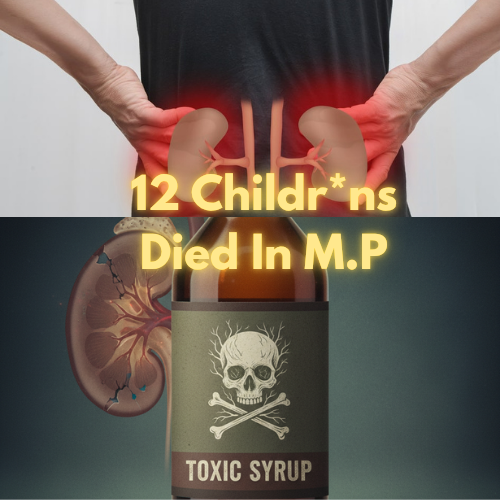In a devastating development, authorities have confirmed the deaths of twelve children—nine in Madhya Pradesh and three in Rajasthan—due to suspected renal failure triggered by the use of contaminated cough syrup.
This alarming trend has pushed the Union Health Ministry into immediate action: banning affected products, ordering inspections, and issuing nationwide advisories on pediatric cough medicines.
Timeline and Spread of Tragedy
Since September 7, the first reports emerged of children collapsing with symptoms of kidney failure. Most of these cases hails from Chhindwara district (MP) and Nagpur region, where 13 children are currently hospitalized undergoing treatment.
The crisis later extended into Rajasthan, where three additional deaths have been tied to the same syndrome
What the Investigations Found
Laboratory tests of suspect cough syrups—particularly Coldrif, a widely used pediatric formulation—revealed the presence of diethylene glycol (DEG) beyond permissible limits, a toxic industrial chemical known to cause severe kidney damage.
Earlier, central officials had claimed that samples from Madhya Pradesh did not show contamination, but subsequent findings from Tamil Nadu’s testing mandated a reversal.
To ensure comprehensive oversight, the Central Drugs Standard Control Organisation (CDSCO) has launched risk-based inspections across manufacturing sites in six states.
A multi-disciplinary investigative team including ICMR, AIIMS-Nagpur, and the National Institute of Virology is analyzing clinical samples, environmental factors, and manufacturing protocols.
Government & Regulatory Response
-
The Madhya Pradesh government has immediately banned Coldrif and suspended the sale of all medicines made by the implicated manufacturer.
-
In Rajasthan, the state has suspended its drug controller and halted distribution of 19 different medicines by the same manufacturer until a full audit is complete.
-
At the national level, the Health Ministry has issued a public advisory against prescribing or dispensing cough and cold syrups to children under two years of age, and cautioned judicious use even for children up to five.
What This Means & Lessons Learned
This tragedy is part of a broader, alarming pattern. In previous international incidents—such as in Gambia and Uzbekistan—cough syrups contaminated with diethylene or ethylene glycol claimed children’s lives.
The recent event underscores the urgent need for stringent manufacturing oversight, transparent regulation, and rapid response mechanisms in India’s pharmaceutical sector.
It also challenges medical norms: cough and cold symptoms in young children are often self-limiting; widespread use of medicines in children, especially under two years old, must be reassessed.
Call to Action for Consumers & Health Providers
-
Parents: Avoid administering over-the-counter cough syrups to infants or toddlers without explicit pediatric guidance.
-
Doctors and Pharmacists: Strictly adhere to dosage, check product authenticity, and avoid combining multiple medicines in pediatric prescriptions.
-
Regulators: Strengthen independent lab audits, enforce compliance with Good Manufacturing Practices (GMP), and trace supply chains.
-
Public Health Bodies: Launch awareness campaigns about the risks of adulterated medicines and empower reporting systems for adverse events.

